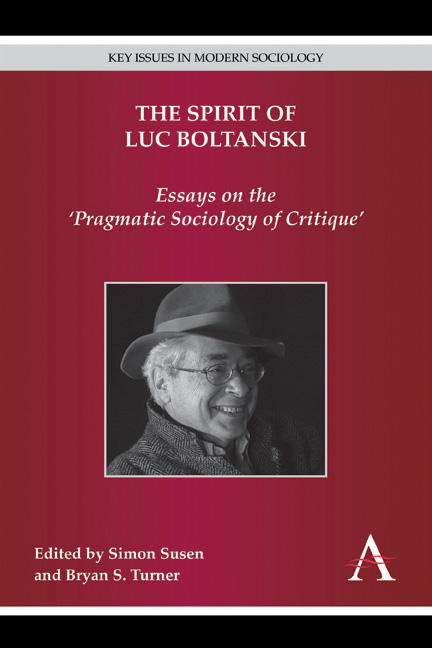Book contents
- Frontmatter
- CONTENTS
- List of Contributors
- Preface
- Part I Introductory Remarks
- Part II Luc Boltanski and (Post-) Classical Sociology
- Part III Luc Boltanski and Pragmatism
- Part IV Luc Boltanski and Critique
- Part V Luc Boltanski and Critical Sociology
- 9 Pierre Bourdieu and the Early Luc Boltanski (1960–1975): Collective Ethos and Individual Difference
- 10 Beyond Pragmatic Sociology: A Theoretical Compromise between ‘Critical Sociology’ and the ‘Pragmatic Sociology of Critique’
- 11 Towards a Dialogue between Pierre Bourdieu's ‘Critical Sociology’ and Luc Boltanski's ‘Pragmatic Sociology of Critique’
- Part VI Luc Boltanski and Political Sociology
- Part VII Luc Boltanski and Contemporary Issues
- Part VIII Luc Boltanski in Conversation
- Part IX Luc Boltanski and His Critics
- Index of Names
- Index of Subjects
11 - Towards a Dialogue between Pierre Bourdieu's ‘Critical Sociology’ and Luc Boltanski's ‘Pragmatic Sociology of Critique’
from Part V - Luc Boltanski and Critical Sociology
Published online by Cambridge University Press: 05 December 2014
- Frontmatter
- CONTENTS
- List of Contributors
- Preface
- Part I Introductory Remarks
- Part II Luc Boltanski and (Post-) Classical Sociology
- Part III Luc Boltanski and Pragmatism
- Part IV Luc Boltanski and Critique
- Part V Luc Boltanski and Critical Sociology
- 9 Pierre Bourdieu and the Early Luc Boltanski (1960–1975): Collective Ethos and Individual Difference
- 10 Beyond Pragmatic Sociology: A Theoretical Compromise between ‘Critical Sociology’ and the ‘Pragmatic Sociology of Critique’
- 11 Towards a Dialogue between Pierre Bourdieu's ‘Critical Sociology’ and Luc Boltanski's ‘Pragmatic Sociology of Critique’
- Part VI Luc Boltanski and Political Sociology
- Part VII Luc Boltanski and Contemporary Issues
- Part VIII Luc Boltanski in Conversation
- Part IX Luc Boltanski and His Critics
- Index of Names
- Index of Subjects
Summary
Introduction
One of the most fruitful sources of controversy in the contemporary sociological literature, notably in France, is the debate on the relationship between two prominent paradigmatic programmes, which are often regarded as diametrically opposed: on the one hand, Pierre Bourdieu's critical sociology, which has been increasingly influential since the 1970s; on the other hand, Luc Boltanski's pragmatic sociology of critique, which has become widely known since the late 1980s. Not only in recent Francophone intellectual discussions, but also in current Germanophone and Anglophone sociological disputes, the writings of both Bourdieu and Boltanski are commonly considered as major contributions to the social sciences.
Although their works have attained a remarkable degree of recognition in contemporary academic fields, and despite the fact that the intellectual connections between ‘critical sociology’ and the ‘pragmatic sociology of critique’ have been explored by various commentators, the key points of convergence and divergence between Bourdieu and Boltanski have hardly been examined in a systematic fashion. To the extent that most studies concerned with the important insights provided by these two thinkers emphasize the profound differences between their sociological frameworks, it appears difficult – or, perhaps, even inconceivable – to suggest that it is possible to reconcile, let alone integrate, Bourdieusian and Boltanskian modes of investigation. The main purpose of this chapter is to make a case for the ‘reconciliation’ between Bourdieu's ‘critical sociology’ and Boltanski's ‘pragmatic sociology of critique’. With the aim of demonstrating that it is not only viable but also desirable to ‘make them compatible’ and thereby pursue ‘an objective of pacification’, the analysis will scrutinize the principal points of convergence and divergence between Bourdieu's ‘critical sociology’ and Boltanski's ‘pragmatic sociology of critique’. By way of conclusion, the chapter formulates eight hypotheses regarding the possibility of cross-fertilizing these two approaches.
I. Points of Convergence between Bourdieu and Boltanski
There are several points of convergence between Bourdieu's ‘critical sociology’ and Boltanski's ‘pragmatic sociology of critique’.
- Type
- Chapter
- Information
- The Spirit of Luc BoltanskiEssays on the 'Pragmatic Sociology of Critique', pp. 313 - 348Publisher: Anthem PressPrint publication year: 2014

